

Mrs.Baia's Adult ESL Classroom: Debates ! ESL Adult Lesson. For your next lesson why don't you do debates?
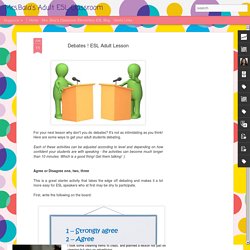
It's not as intimidating as you think! Here are some ways to get your adult students debating. Each of these activities can be adjusted according to level and depending on how confident your students are with speaking - the activities can become much longer than 10 minutes. Which is a good thing! Get them talking! Agree or Disagree one, two, three This is a great starter activity that takes the edge off debating and makes it a lot more easy for ESL speakers who at first may be shy to participate. First, write the following on the board: Next, give your students cards with the numbers 1, 2, 3, 4 and 5 on them. Next, you read aloud some prepared statements that you've made. 1. 2. 3. After you read one statement, ask the students to hold up a number from 1 -5 that expresses their level of agreement (as seen on the whiteboard). Do this a few times, get everyone as much as you can in the debate. 1. 2. 3. Useful Phrases. Pro et Contra: 20 Stages of Teaching Controversial Topics.
33 Controversial Discussion Topics: And How To Teach Them. Debate Champions: 9 Steps to Organizing Great ESL Debates. Welcoming Comments. Moderator: Good evening and welcome to the UPC [University Program Committee] Religious Affairs and Horizons Committee debate on creation, special creation, versus evolution.
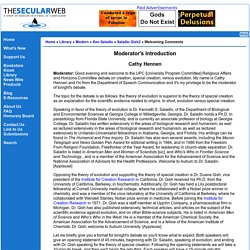
My name is Cathy Hennen and I'm from the Department of Speech Communication and it's my privilege to be the moderator of tonight's debate. The topic for the debate is as follows: the theory of evolution is superior to the theory of special creation as an explanation for the scientific evidence related to origins. In short, evolution versus special creation. Speaking in favor of the theory of evolution is Dr. Kenneth S. Opposing the theory of evolution and supporting the theory of special creation is Dr.
Strategies that Work: Debates in the Classroom. Description There's no debate about it!
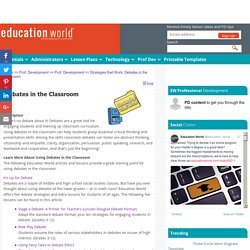
Debates are a great tool for engaging students and livening up classroom curriculum. Using debates in the classroom can help students grasp essential critical thinking and presentation skills. Among the skills classroom debates can foster are abstract thinking, citizenship and etiquette, clarity, organization, persuasion, public speaking, research, and teamwork and cooperation.
And that's just the beginning! Debate topics – Tim's Free English Lesson Plans. Photo credit:en.wikipedia.org Follow me on twitter @RobbioDobbio Before you use these materials, why not check out our new podcast for learners and teachers alike?
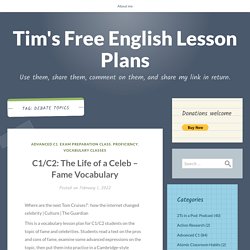
It’s called 2Ts in a Pod, have a listen here: This is a conversation lesson plan to practise past (3rd) conditional structures whilst debating the value of specific professions to society. Credit to the university of Kent for the inspiration for the activity. You will need the handout, I have made 4 versions: Intermediate teens: Stage a Debate: A Primer for Teachers (Lincoln-Douglas Debate Format) [facebookbadge] Brief Description Try the standard debate format.

Includes adaptations of the format plus ten more strategies for engaging students! Objectives Students will understand the debate process. Keywords. Debates in the middle school classroom. Why do we have dress codes?
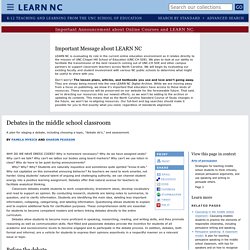
Why is homework necessary? Why do we have assigned seats? Why can’t we talk? Why can’t we tattoo our bodies using board markers? Why can’t we use lotion in class? Why? Classroom debates enable students to work cooperatively, brainstorm ideas, develop vocabulary and read to support an opinion. Debates allow students to become more proficient in speaking, researching, reading, and writing skills, and they promote reasoning as well as communication skills. Before the debate A debate is a discussion in which participants articulate, justify, and clarify their positions on an issue. Select the topic The topic for a debate evolves from what you are teaching. Bring It On: How to Get Students Fired Up About English with ESL Debates. What comes to mind when you hear the word “debates”?

TV debates, politicians contradicting each other before elections or…debates in class between student teams? Well, in case you aren’t familiar with this exciting method in ESL classes, I’m going to lay it all out on the table for you. Trust me. I have used debates in my classes for some time now and I would love to share these teaching experiences, as well as tips and resources on this method with all readers here. 1. A debate is a competition in which two opposing teams make speeches on a particular topic and motion to support their arguments and contradict the members of the other team.
A debate in ESL class can be based on a specific topic that has recently been taught, therefore strengthening language skills and vocabulary but also critical thinking on the part of the students. There should also be a judges’ table made up of 3-4 students who will be evaluating the whole process and assessing each team based on certain criteria. 2. 3. Debates, discussion & speaking activity lessons for esl teachers: eslflow webguide.